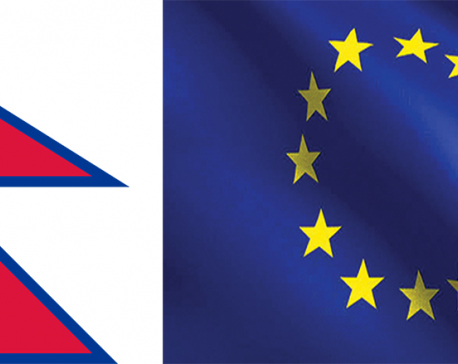
OR
Opinion
Nepal must be ready for Kunming and Glasgow
Published On: July 8, 2021 04:30 PM NPT By: Simone Galimberti


Simone Galimberti
Simone Galimberti is the Co-Founder of ENGAGE, an NGO partnering with youths to promote social inclusion in Nepal.simone_engage@yahoo.com
Two upcoming key global summits should be adequately prepared with a strong inclusive public engagement at home and smart diplomacy around the world.
With the 26th Conference of the Parties to the United Nations Framework Convention on Climate Change (UNFCCC), also known as COP 26, approaching soon, negotiations among nations are gearing up in order to ensure tangible and meaningful outcomes during the summit.
The recently concluded G7 was in many aspects a disappointment despite some vague commitments on stopping financing coal projects that lack carbon capture and storage technology.
Besides a commitment to “international financing with the global achievement of net zero GHG emissions no later than 2050 and for deep emissions reductions in the 2020s” there was no major announcement on the key climate financing front.
Apparently, a country like Nepal has little if not none of the means to influence the global agenda when we talk about global issues like climate change but it is still worthy for the Federal Government to work in partnerships with the civil society, the private sector and the local governments to strongly prepare itself for the upcoming negotiations.
This won’t require only extensive discussions within the country but also a more incisive diplomatic action in all capitals where Nepal has a resident ambassador and within the United Nations in New York.
On the first front related to bringing the country together through an enabling national debate on climate change, it is essential that the new federal Government, with many new ministers in the Cabinet, should rely more on expertise among national stakeholders within the civil society and the private sector.
Fortunately, the country can count on a vast number of specialists and activists in matters of climate change and conservation - the latter a subject strictly linked to the former and itself a priority for the country’s long term “viability”.
Considering that in October a major global summit on biodiversity will be held in Kunming, China, officially the UN Biodiversity Summit or the 15th Conference of Parties to the Convention on Biodiversity, the Federal Government should come up at the earliest with a broad stakeholder engagement strategy to prepare a common position on these key upcoming negotiations.
Ensuring inclusion in such an exercise is going to prove how serious the country is in creating opportunities for all citizens to participate and engage in a better and more open form of policy making.
The many youths, so passionate about climate change and conservation, must be allowed not only to be on the table but also to co-lead the discussions.
Being truly inclusive implies enabling them to participate in shaping the country’s position in matters of conservation and climate change.
Among them, disadvantaged youth, including dalit and youth living with disabilities and youth belonging to sexual minorities should have an opportunity to be involved and be engaged in the discussions.
Krishna Gahatraj, a social inclusion expert and a-Bridge CRPD-SDGs Article 11 Fellow of International Disability Alliance, believes that there “there is a misconception that climate change does not have impact on persons with disabilities. This is not true, in fact.”
“As a fact, persons with disabilities are often among those most adversely affected in an emergency, sustaining disproportionately higher rates of morbidity and mortality, and at the same time being among those least able to have access to emergency support”.
He further shares “ensuring meaningful participation, inclusion and leadership of persons with disabilities within disaster risk management and climate-related decision-making at the local, national, regional and global levels, lies at the heart of an approach to climate action that is respectful of the rights of persons with disabilities”.
Ideally this time around the civil society led by many youth activists from all socio economics groups and the private sector (we should not forget the bold national strategy recently presented by FNCCI) should not just propose some recommendations to the government but have some of its members included in the official delegations.
No matter how tricky such a selection process might end up to be, it is really a priority that the Federal Government embraces participation of experts and activists from non-state sectors.
Their involvement in Kunming and Glasgow will also be positively seen by the international community, generating positive goodwill towards the country, showing that a young democracy, like Nepal, despite the internal challenges, can still be at the forefront of a new form of a more participatory decision making able to include its citizens.
Even if there will be a risk of incurring, at the end, in pure tokenistic exercises, the participation of non-state actors in the negotiations will certainly facilitate the work of the governmental officials in charge of the process.
At the same time, a strong engagement nationally must be accompanied by smart diplomacy.
On this front, we recently witnessed how determination, tenacity and smart diplomacy supported the country in securing essential health equipment even from a nation like Spain that does not have a formal development cooperation program in Nepal.
The country should take advantage of the good image it commands around the world thanks to its incredible intangible heritage that made it known across the globe.
That’s why the nation’s ambassadors must be extensively briefed and empowered so that they can be in a position to exert pressure on their hosting countries on how the outcomes stemming from Kunming and Glasgow will truly be the determinants of Nepal’s future.
Let’s not discount the power of traditional diplomacy.
I recently had the opportunity to read about the incredible work that, between 2012 and 2015, Ambassador Macharia Kamau of Kenya did to secure the international community’s agreement on the Sustainable Development Goals.
Despite mounting pressure and divergent positions, Ambassador Kamau, now the Principal Secretary to the Ministry of Foreign Affairs in Nairobi but back then his nation’s Permanent Representative to the United Nations, secured a global agreement not only on the number and types of the SDGs but also on the official wording of the Agenda 2030.
Can Nepal rely on his own Permanent Representative to the United Nations in New York to ensure that the country's core interest in the upcoming negotiations will be protected and enhanced?
Nepal is a key and well-respected member of the G77 that brings together the developing and lower middle income countries.
Ambassador Amrit B. Rai, Nepal’s Representative to the UN in New York, is competent and well experienced and he can get the attention of the Prime Minister.
With his work cut out to ensure that the nation will play a prominent role in matters of biodiversity and climate change negotiations, Ambassador Rai should be given a broader mandate in the months ahead.
Going perhaps beyond his traditional “job description”, he will have to ensure that Nepal’s positions on the negotiating table will be not only heard but also be well-articulated, proving that the country can be a well-respected and well-prepared leader in matters of climate change and biodiversity not only within the G 77 but also in the global arena.
Hoping that Nepal will be able to articulate in these two key areas a strong strategy of national inclusive engagement while being able to showcase its diplomatic abilities, we wish an all-inclusive Team Nepal best of luck.
(Galimberti is the Co-Founder of ENGAGE, an NGO partnering with youths living with disabilities. Opinions expressed here are personal. He can be reached at simone_engage@yahoo.com.)
You May Like This
_20211027160750.jpg)
Climate Change Scenario of Nepal
In Nepal, the majority of people affected by climate change are women who are disproportionality at risk, whether from floods,... Read More...

Nepal’s climate action
That we have to face the adverse impacts of climate change is certain. Question for Nepal is whether we are... Read More...

Four decades of partnership
From the beginning, EU-Nepal relations have been based on mutual respect, learning from each other and support to Nepal’s development Read More...










Just In
- Heavy rainfall likely in Bagmati and Sudurpaschim provinces
- Bangladesh protest leaders taken from hospital by police
- Challenges Confronting the New Coalition
- NRB introduces cautiously flexible measures to address ongoing slowdown in various economic sectors
- Forced Covid-19 cremations: is it too late for redemption?
- NRB to provide collateral-free loans to foreign employment seekers
- NEB to publish Grade 12 results next week
- Body handover begins; Relatives remain dissatisfied with insurance, compensation amount







Leave A Comment